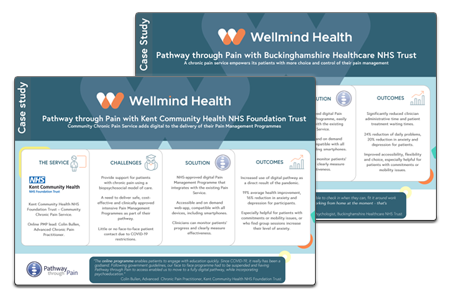The Service 
Chronic Pain Programme
Contact: Donna Claydon, Senior Commissioning Manager
Challenge 
High demand and limited service capacity
Time-consuming consultations and interventions
Protracted patient waiting times
Effective, accessible, high-quality alternative sought within budgetary constraints
Solution 
An online Pain Management Programme, easy to integrate with the existing pain service
NHS DTAC Certified
Simple to follow and easy to access from all devices with no time limits or restrictions
Clinicians able to monitor participants' progress and measure effectiveness
Outcomes 
Significantly reduced clinician administrative time and patient treatment waiting times
Improved service capacity, accessibility, flexibility and choice
Patients empowered to take control of their treatment
17% Average Anxiety Reduction
12% Average Health Improvement
13% Average Depression Reduction
"The online service quickly became an important part of the pain management programme, sometimes as a stand alone intervention and sometimes alongside other courses of treatment."
"I've had some good feedback from patients. It's particularly helpful as a precursor to a pain clinic referral as it's something they can start on immediately and I don't feel like I've just left them waiting."
Patient Feedback
Lynda
Participant Testimonial
Frankie
Participant Testimonial
Anna
Participant Testimonial
Summary
Isle of Wight NHS CCG Pain Management Service has been offering Pathway through Pain to its patients since 2017. The digital program delivers expert teaching, guidance on physical exercises, and mental health support for those dealing with chronic pain.
"We've seen demand on our services increase, especially following the Covid-19 lockdowns. MSK conditions have increased as more people have been sedentary and fewer people have been going to their GP until later in their condition development – partly out of concern regarding Covid-19 but also due to the overwhelming support residents have shown to help maintain NHS capacity at this time. After months of this, conditions have become more frequent and are of higher complexity."
Donna Claydon, Senior Commissioning Manager
Engaging with this digital solution has enabled suitable patients - higher volume, lower complexity cases - to receive immediate, generic guidance to help them self-manage their conditions. In the context of limited service capacity, this additional channel of support has significantly reduced patient waiting times and reduced the overall workload of staff.
Participants continue to show measurable, positive outcomes on completion of the program when utilising the embedded clinical assessments (GAD7, PHQ9, ODI and PSEQ). They report improved mobility and increased quality of life, as well as reduced scores for anxiety and depression.
Medical staff particularly appreciate that the digital platform enables a detailed tracking of patient engagement and outcomes, something that many other services are still unable to provide.




